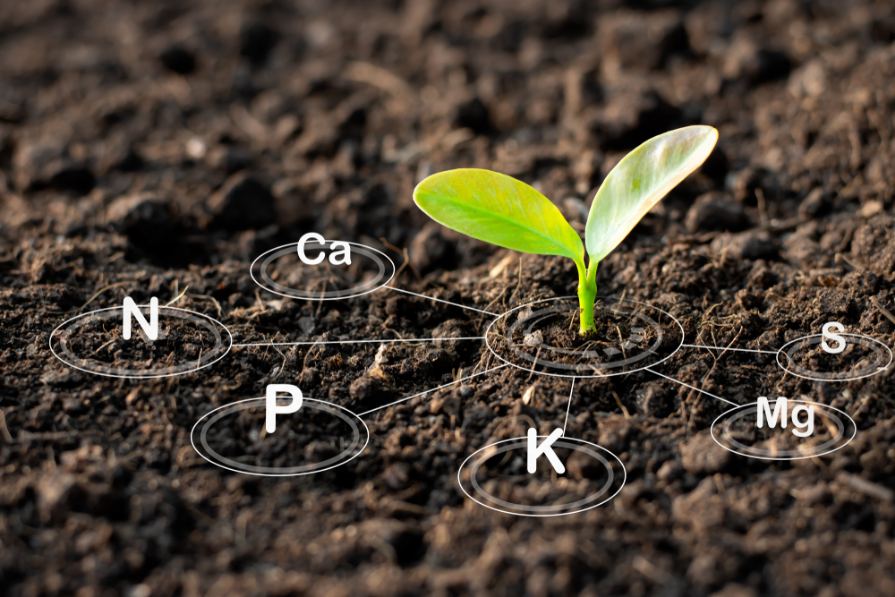
Plant nutrition is a fundamental aspect of plant care and and health. Understanding the essential nutrients required by plants, their roles, and how to provide them is crucial for ensuring healthy and thriving vegetation. Plants require a balanced supply of macronutrients and micronutrients to support their growth and development. Additionally, fertilizers play a vital role in supplementing nutrient deficiencies in soil and optimizing plant health.
Macronutrients are the primary nutrients that plants need in large quantities to fulfill their nutritional requirements. The three main macronutrients are nitrogen (N), phosphorus (P), and potassium (K), often referred to as NPK. Nitrogen is a crucial component of amino acids, proteins, and chlorophyll, playing a vital role in promoting leaf and stem growth. Phosphorus is essential for energy transfer and is vital for root development, flowering, and fruiting. Potassium helps regulate water uptake, enzyme activation, and overall plant vigor.
Micronutrients, on the other hand, are required in smaller amounts, but their absence can still limit plant growth. Micronutrients include elements such as iron (Fe), manganese (Mn), zinc (Zn), copper (Cu), molybdenum (Mo), boron (B), and chlorine (Cl). These elements are necessary for various metabolic processes within plants, including enzyme activation, electron transfer, and the synthesis of vital compounds. Micronutrient deficiencies can lead to stunted growth, chlorosis, or necrosis in plants.
While soil naturally contains some amount of macronutrients and micronutrients, their availability may vary depending on factors such as soil type, pH, and organic matter content. This is where fertilizers come into play. Fertilizers are substances that are added to soil or plants to provide essential nutrients that may be deficient. They help bridge the nutrient gap and ensure plants have an adequate supply of the required elements.
Fertilizers are typically classified as either organic or inorganic, with each type having its own benefits and considerations. Organic fertilizers are derived from natural sources such as animal manure, compost, and plant materials. They release nutrients slowly over time as they break down, improving soil structure and microbial activity. Inorganic fertilizers, also known as synthetic or chemical fertilizers, are manufactured through industrial processes. They contain concentrated forms of nutrients and provide immediate availability to plants.
Nutrient deficiencies in plants can manifest in various ways, often exhibiting specific symptoms. Nitrogen deficiency, for example, can result in pale or yellowish leaves and overall stunted growth. Phosphorus deficiency may cause poor root development and delayed flowering. Potassium deficiency can lead to weak stems, leaf scorching, and reduced disease resistance. Micronutrient deficiencies can vary depending on the specific element lacking, but common symptoms include interveinal chlorosis (common in Las Vegas soils due to lack of available iron), leaf distortion, and poor fruit development.
To address nutrient deficiencies, it is essential to identify the specific deficiency through soil or tissue testing and adjust the nutrient supply accordingly. This can be done by applying fertilizers targeted to the specific lacking nutrient. However, it is crucial to strike a balance and avoid overfertilization, as excessive nutrient levels can be detrimental to plant health and the environment.
Plant nutrition is a complex subject that encompasses macronutrients, micronutrients, fertilizers, and nutrient deficiencies. Providing plants with a well-balanced supply of essential nutrients is essential for their growth, development, and overall health. Understanding the specific requirements of different plants and soil conditions can help gardeners and farmers optimize nutrient availability and ensure thriving vegetation.
Chip-N-Dale’s recommends and administers two efficient methods for delivering nutrient-rich fertilizer to plants: 1) deep-root fertilization and 2) fertigation using the EZ-FLO(tm) micro-dosing injection system. We would be happy to discuss the details of each method and which one might be the best fit for your circumstances.
